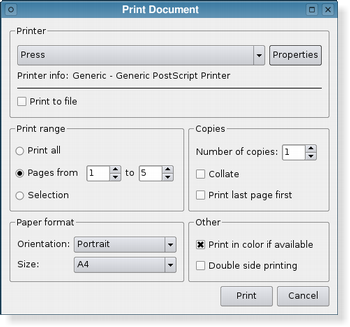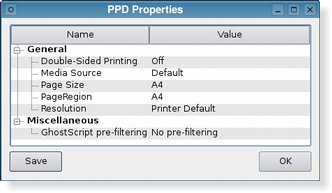| Home · All Classes · Modules |
The QPrintDialog class provides a dialog for specifying the printer's configuration. More...
Inherits QAbstractPrintDialog.
The QPrintDialog class provides a dialog for specifying the printer's configuration.
The dialog allows users to change document-related settings, such as the paper size and orientation, type of print (color or grayscale), range of pages, and number of copies to print.
Controls are also provided to enable users to choose from the printers available, including any configured network printers.
Typically, QPrintDialog objects are constructed with a QPrinter object, and executed using the exec_() function.
QPrintDialog printDialog(printer, parent); if (printDialog.exec() == QDialog.Accepted) { // print ... }
If the dialog is accepted by the user, the QPrinter object is correctly configured for printing.
 |
 |
The printer dialog (shown above in Plastique style) enables access to common printing properties. On X11 platforms that use the CUPS printing system, the settings for each available printer can be modified via the dialog's Properties push button.
On Windows and Mac OS X, the native print dialog is used, which means that some QWidget and QDialog properties set on the dialog won't be respected. The native print dialog on Mac OS X does not support setting printer options, i.e. setOptions() and setOption() have no effect.
In Qt 4.4, it was possible to use the static functions to show a sheet on Mac OS X. This is no longer supported in Qt 4.5. If you want this functionality, use QPrintDialog.open().
The parent argument, if not None, causes self to be owned by Qt instead of PyQt.
Constructs a new modal printer dialog for the given printer with the given parent.
The parent argument, if not None, causes self to be owned by Qt instead of PyQt.
Constructs a print dialog with the given parent.
This signal is emitted when the user accepts the values set in the print dialog. The printer parameter includes the printer that the settings were applied to.
Reimplemented from QDialog.done().
Closes the dialog and sets its result code to result. If this dialog is shown with exec_(), done() causes the local event loop to finish, and exec_() to return result.
Note: This function does not apply to the Native Print Dialog on the Mac OS X and Windows platforms, because the dialog is required to be modal and only the user can close it.
See also QDialog.done().
Reimplemented from QAbstractPrintDialog.exec().
This is an overloaded function.
Opens the dialog and connects its accepted() signal to the slot specified by receiver and member.
The signal will be disconnected from the slot when the dialog is closed.
This function was introduced in Qt 4.5.
Sets the given option to be enabled if on is true; otherwise, clears the given option.
See also options and testOption().
Reimplemented from QWidget.setVisible().
Returns true if the given option is enabled; otherwise, returns false.
See also options and setOption().
This is the default overload of this signal.
| PyQt 4.12.1 for X11 | Copyright © Riverbank Computing Ltd and The Qt Company 2015 | Qt 4.8.7 |